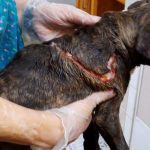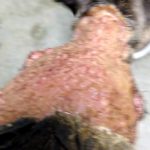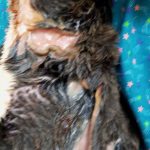Wishing you the very best of luck. I have quite a few videos on this and you can also search Ivdd at kmdvm.blogspot.com. There’s lots of info there too
Hello I recently watched a lot of your videos on youtube about ivdd and the beagle you were taking care of. My Gracie was diagnosed with ivdd yesterday and my vet gave her a steroid shot and she is now on steroid medication prednisone, pain killers and muscle relaxers. She is not able to walk or stand on her own, her right leg drags, her left leg seems normal. I have been using a makeshift sling to help her use the restroom, she is able to pee and poop on her own as long as I am helping her stand outside with a sling. She sometimes sits up in bed but mainly only using her upper body. Is this a good sign? My vet said I need to put her on a diet and give her strict rest but my vet also said if she is not better in two days I should take her to get surgery. I am relucatant to get surgery not just because of the cost but because my Gracie is 11 years old and I am afraid that it could worsen the paralysis in her other legs or it might be only a temporary fix. Me and my parents want to try naturally helping her, and I am not sure how to start or what to do. Should I just try making her get strict cage rest and see what happens or should I start physical therapy right away? I am planning on calling my vet to see what she thinks but from what she told me yesterday she seems pretty set on surgery only. Gracie has only been laying on one side when laying down. Her left side. Her right side is the side with the bad dragging leg. She is eating well and drinking well, I just want her to get better soon. Any advice or suggestions you can give me would be great. Thank you Krista.
Sincerely,
Gracie’s mom.
Comments
My baby Brownie was diagnosed with IVDD 6 days ago. I didn’t go for the surgery due to the cost. I’m giving him crate treatment at home he’s on two pain meds and a steroid at the moment. I hate seeing my baby in pain but I’m trying to stay positive. I saw your video on YouTube and it was very positive and hopefully. I’m hoping you can share any advice on our I can bring my baby back to good health. Currently his back legs aren’t working and he has no control over his bladder so I’m helping him go potty and cleaning his pee pad. His back and neck are in pain. I’m hoping he can make a great recovery.
Comments
My 4yo Labrador Retriever Hank recently (two weeks prior) underwent a Tibial Plateau Levelling Osteotomy (TPLO) to repair the torn cruciate ligament in his back left knee. He gradually increased activity in the affected leg, but now seems as if his progress has halted. He’s very hesitant to put anymore weight on that leg. He won’t walk up a small step to get into my bedroom (this was the case before the surgery too). He moves around somewhat freely in the yard, but reverts to standing on three legs or doing a three-legged hop to move around at times. He has taken a bad step two to three times that resulted in a loud cry out. He must be coaxed to move around at all and appears to have developed a plum-sized seroma at surgery site of the infected knee. Could this be leading to the halt in activity/progress? He allows me to massage the muscles above and below the affected knee. We have also been doing some range of motion exercises on both legs.
Seroma?: He allows me to touch it and it is soft to the touch. It feels like a water balloon filled with a slightly more viscous fluid. It is directly above the incision site and the fluid appears to rest directly on top of the knee joint. Per vet recommendation, I discontinued the use of Rimadyl to try to reduce the size of the seroma.
Other symptoms: Licking at the base of tail to the point of seeing some blood in his fur. Excessive licking of the blanket he sleeps on.
Comments
My dog is 6 months old roughly and she started her heat cycle for the first time 6/10/21 and her brother (unaltered) and her got “stuck” few days ago I know she is pregnant and she started to lightly spot blood Yesterday. What could happen from this besides the fact That puppies may not make it? Also she is pitbull/ rottweiler mix
Comments
My 16 year old cat has been diagnosed with some kind of nasal cancer. I don’t know which specifically because I didn’t want to pay for the tests that would specify which kind. Regardless, we are not treating the cancer; we are giving her supportive care. She is currently on steroids (prednisolone) and painkillers (gabapentin). With all of this, she has recently had a new symptom: a bulging of the bridge of her nose. At first, I thought it might be the cancer, but then one day, it popped open, and started leaking fluids (probably blood mixed with other things). I gave her first aid, and it healed. Now, it’s doing it again, but the fluid is building back up, even after leaking out. I called the vet after the first time this had happened, and was told that things like this would keep happening, and that she’s probably near the end of her life. Nothing about what it could be or how to handle it.
So my questions are, should I see a different vet? Does the pressure cause her pain? Is there some way to treat this? I haven’t euthanized her yet, because she still seems to enjoy life.
Comments
Hello, I work at a shelter. One of the puppies got parvo and she was given fluids subcutaneously. She was on antibiotics and has gotten through the parvo, but has gotten a horrible skin infection. (Most likely due to the needle injections given for fluids) Her skin started popping open and draining puss, and what started out as small draining spots, became larger and larger, until large sections of fur/skin sloughed off. The vet put her on Clavamox and has told us to clean with peroxide, then antibacterial soap, then apply a yellow greasy cream. I guess I question the daily peroxide as it makes her cry and it becomes so raw. I am attaching photos and they are disturbing, but the puppy is eating and drinking and I know it will be a long recovery, but I have to try. If a vet sees my post, please tell me what you think the wound care treatment should be. I think too much peroxide is harmful, but don’t know. The vet we use has given questionable care to some other dogs we have taken to her, so I need a second opinion.
Comments
Good Day Everyone,
My question is about my 6 week old dachshund pup Hazel
She is healthy and super active but I have noticed that she will cry all the time until I pick her up ( I work from home too so I have plenty of time for her but meetings are hard lol )
Comments
Hi Pawly Friends, my 3-year-old cat is having UTI and has a blockage. He has a very hard time with urine and sometimes he urined blood. He has no appetite to eat, but when he gets too hungry he will eat his dry food that the vet provided. I brought him to the vet two weeks ago. They unblocked him using a catheter and hospitalized him for almost a week without IV fluids. I brought him back but he’s still weak and wouldn’t eat. After a day of staying at home, he peed in blood in such a big amount. I brought him to the vet again at around 1 am because I was too afraid. The vet uses the catheter again and hospitalized him for another week. Again, I brought him home with some antibiotics and some other meds, he was so hungry because he didn’t eat well in the hospital. I boiled fish for him (no added spices, preservatives, etc) to mix with the dry food because he wouldn’t eat it alone. He ate and drank a lot. After 3 days, he started to pee in the blood again! HELP I don’t know what else can I do to help my baby!
Comments
Hello Dr Magnifico
I watched your video on Beerus the cat (Megacolon/ Obstipation) on YouTube! Currently my 8 year old English bulldog was diagnosed with megacolon. My dog is my life. The last week I’ve spent $4000 which included a deobstipation. The deobstipation wasn’t successful as there is a hard piece deep in the colon. They stated they removed a good amount but couldn’t reach the hard piece deeper in the colon and he will need two more procedures. I truly can’t afford to spend any more money and I don’t want anything to happen to my dog. Each procedure is about 2500 in the area and that only includes 24 hour care. Right now he is feeling much better but that piece is still in there. I’ve increased his exercise to 2-3 short walks. I’ve also changed his diet. Chicken, very little rice, raw liver, flaxseed, watermelon, blueberries, coconut oil, green beans, carrots and pumpkin. He’s feeling much better and is having diarrhea which I hope is chipping away from that hard piece. Can you recommend anything? Days ago he was vomiting, shaking, couldn’t walk, didn’t eat or drink and was lethargic. It was so scary! I literally would do anything for this dog. But I can’t keep shoveling out thousands of dollars and not get any results. Anything would help, I can’t have anything happen to my boy. You also mentioned to learn how to palpate the abdomen. Can you explain how that is done. Any help or recommendations would be much appreciated. Thank you!
Comments
Possible anal sac issue? I am currently unable to drive due to a tbi so I’m trying to figure out if this can wait until Monday or not. She is a 4 year old lab mixing started licking the area last night. Other than that, she’s going to the bathroom fine and she has a little area of concern which I’m attaching the picture for. She’s acting normal, eating, drinking, playing.











Good morning-
So sorry about Gracie. Dr. Magnifico has a lot of videos on YouTube regarding ivdd AND she has information on her blog- diary of a real life veterinarian- that you may find helpful. Very best of luck to you and Gracie!!????????